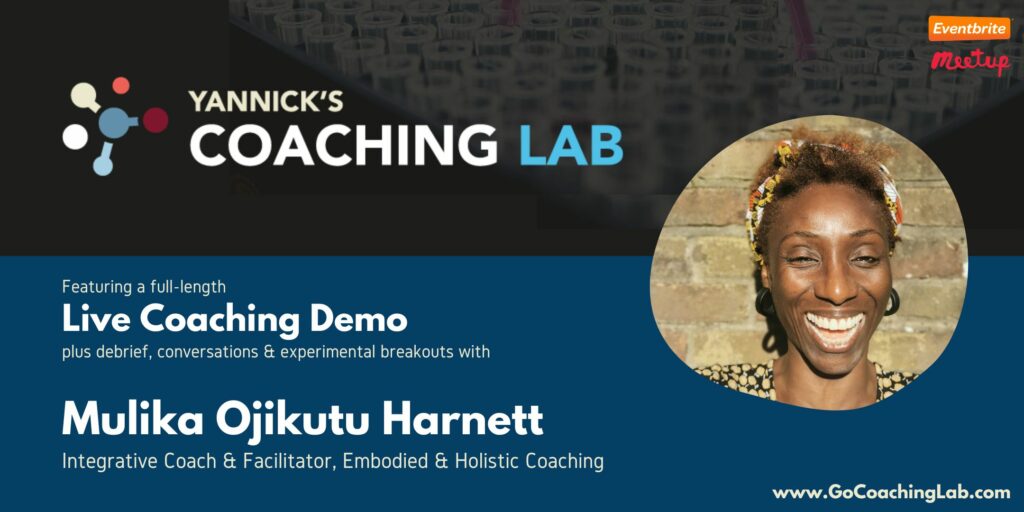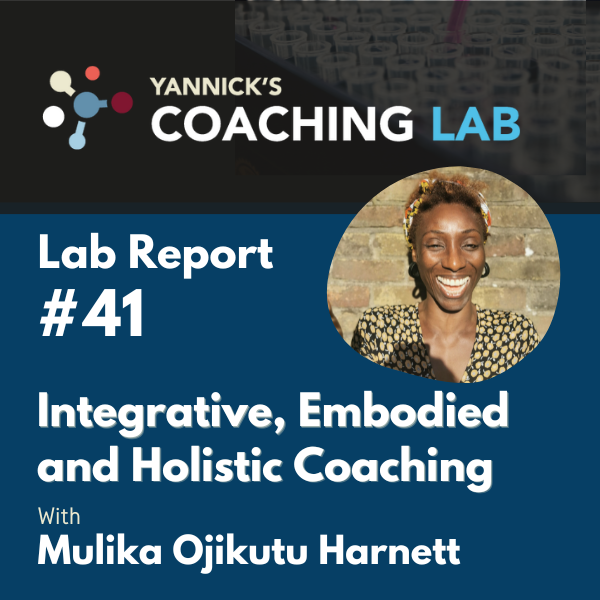
Yannick’s Coaching Lab features guest coaches from a broad variety of approaches, who showcase how they work as part of a live 45min coaching session, followed by reflections and Q&A with the audience.
Curious to know what this session was like? Have a peek at the Lab Report below or consider VIP membership to access the full recording of this and many more exciting sessions.
Yannick’s Coaching Lab #41 — Mulika Ojikutu Harnett
Lab Report by Natalie Fraser
Summary
Mulika is trained as a humanistic facilitator and at the Alef Trust as a transpersonal coach. She coaches integratively from a lens of extending generosity and heart, qualities that she feels reside within the Coaching Lab and Coaching cabinet that she has been a member of for quite some time. Very poetic and performative in her coaching style, Yorùbá is Mulika’s first language having immigrated from Nigeria aged 12 and was particularly interested in the rhythms whilst learning English. Mulika is also a trained stage performer to masters level, which comes across strongly in how she shows up in the coaching space. For Mulika, transpersonal-influenced coaching means being with someone holding in mind: the ‘thing’ happening here, the ‘container’, the ‘unifying presence’. Embodiment of self, values, and life is important within Mulika’s coaching as it helps translate and make tangible experience into the ‘doing’/self-actualization/realization of dreams, and she feels that pragmatic coaching enables clients to concretize actions in their daily life.
Mulika and her client had a brief meeting the day before the session during which they discussed ‘arriving together’. Mulika’s client is also a coach. Over the past three years, a lot has happened: living beyond cancer, coaching cancer survivors, building a business, being a single mother, earning money. She entereed the session with a desire to “integrate everything into a world of ‘doing’ whilst remaining in a place of ‘being’”. Currently, ‘doing’ and ‘being’ do not feel like they belong together. She feels being a hermit would take the pressures of overwhelm away, but this is not a possibility due to her responsibilities.
Key Insights
Two minutes at the start of the session were taken for both client and coach to tune into themselves. Mulika guided this by voicing herself noticing, feeling, and naming points of contact with her surroundings, inviting her client to do the same within their mind.
“What do you want to put out first?” invited Mulika when her client expressed that “a lot” had come up for her.
Making sense of her client’s challenge Mulika reflects that “Being is foundational, the fabric of your existence”.
“Spirit, what did you think that you were coming back for” Mulika invites her client to privately reflect, in relation to her sharing her experience of remission and recovery. Holding this question in mind, Mulika asked her client to let her Self become comfortable to lead/guide for the next few minutes to a place where she can have the light of her Self shine on the unknown within. Cultivating a place of safety, Mulika guided her client to walk steadily towards this place, counting down 20 steps, before describing the safe place and its boundaries. Mulika paused briefly, inviting her client to silently converse with herself within the center of this safe space.
Control; responsibility are words that the client did not find comfort in, restricting and boring. Her answer to the question “what did you come back for?” was “to live fully” which her responsibilities were blocking. These responsibilities were explored in relation to the client’s values and expectations. Discerning between values of self and other was found to be familiar and take a lot of mental energy.
Put your needs front and center, encouraged Mulika, sharing her own experience of why this is most important before leading them to explore what this could look like for her client.
Returning to the center of the safe space Mulika closed the session by guiding her client back to the safe space, continuing to elaborate on her description of the safe space and reminding her client that she can always return to it and how she can return to it.
“It’s absolutely okay to be me […] in fact, it’s essential” concluded Mulika’s client.
Lab Key Take-Aways
The performative, poetic style of presence was experienced very positively by Mulika’s client who appreciated their shared journey.
Despite Mulika’s client not being overtly expressive, Mulika was able to connect deeply on an energetic level and interpret her client’s processing of the session. Both were open to “what was passing through”.
Mulika approaches coaching with the attitude that the client has everything within themselves, and the coach is privileged to be invited into a conversation that the client is having with themselves out loud in the room.
Mulika spoke [approximately] 70% of the session, offering guidance but without commanding a need for structure, achievement, or ‘doing’. While the client found that the amount of talking from the coach took away from her time to think, this wasn’t preceived as negative. Both the client & coach reflected that time pressure may have prevented them from further emerging themselves into the silences and thinking moments (typically Mulika’s sessions are 90mins).
Mulika intentionally enabled her client to get out of her doing space, liberating her towards a resonant place of being in a more experiential rather than classic questioning/process-focused way. Following traditional process route may not always be what a client needs.
When we “listen listen” we listen, then listen again, preventing from the distractions of the content and hearing more depth.
Being present and in resonance allows us to help ourselves and help others.
Watch the recording of this session by joining the Lab as a member: www.GoCoachingLab.com
A list of all available recordings can be found at https://bit.ly/LabRecordings
This Lab Report was authored by Natalie Fraser
Natalie is an existential Counselling Psychologist, specialising in trauma and transformation, and curious about coaching. Interested in exploring life’s Big Questions? Find out more at: www.existentialofferings.com

